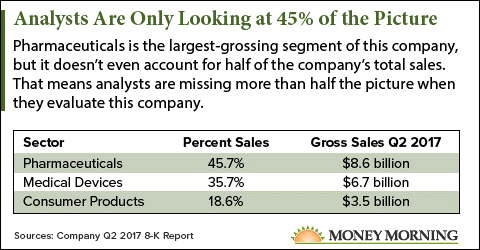In Johnson & Johnson news, the stock is down 1.3% over the last five trading days, and that makes this the perfect time to buy this dividend aristocrat...
 The pullback was caused by two analysts downgrading Johnson & Johnson (NYSE: JNJ) on July 21, but analysts simply don't know how to value JNJ stock.
The pullback was caused by two analysts downgrading Johnson & Johnson (NYSE: JNJ) on July 21, but analysts simply don't know how to value JNJ stock.
BTIG Research downgraded JNJ from "Neutral" to "Sell" because it doesn't think Johnson & Johnson will be able to successfully execute its medical device acquisition.
Alembic Global Advisors downgraded the company from "Neutral" to "Underperforming" but didn't release its rationale.
But Money Morning Director of Technology & Venture Capital Research Michael A. Robinson says JNJ stock is a "foundational holding," one every investor can add to their portfolio. And it's a company analysts consistently get wrong...
Analysts Don't Know How to Value Johnson & Johnson Stock
While JNJ stock fell over the past week over an analyst downgrade, Robinson says analysts simply don't know how to value JNJ.
You see, BTIG Research focused on JNJ's medical device acquisition, but Johnson & Johnson isn't just a medical device company.
JNJ's pharmaceutical division has a strong drug pipeline of 16 treatments that it developed in-house. And it bought Actelion's pipeline in January for $30 billion.
Medical Breakthrough: So small, yet so powerful, this microscopic DOT is about to impact 7 billion people - and create one of the biggest disruptions in human history. Learn more...
"Johnson & Johnson and some of its partners announced plans to file for regulatory approval for a whopping 10 potential blockbuster drugs (good for $1 billion in sales a year) over the next four years," said Robinson in May.

Those drugs could potentially expand its already large pharmaceutical revenue.
Currently, JNJ pharmaceutical sales of $8.6 billion account for about 46% of the company's overall revenue. Its medical devices division accounts for 36%, and consumer products sales add about 18%.
While pharmaceuticals is Johnson & Johnson's highest-grossing division, it is just one part of the picture.
This company is a triple threat, and that means Wall Street analysts just don't know how to value it. Some treat it like a pharmaceutical company, and others treat it like a consumer staple. But Robinson says this confusion is to your benefit.
"The stock is trading at a deep discount right now and is just too tempting to pass up," according to Robinson...
Buying JNJ Stock Before Aug. 25 Will Increase Your Gains by 2.57%
[mmpazkzone name="in-story" network="9794" site="307044" id="137008" type="4"]
Johnson & Johnson operates in three distinct segments:
- Pharmaceuticals
- Medical devices
- Consumer products
This three-pronged approach to business makes it hard for analysts to accurately evaluate the company.
In fact, BTIG Research downgraded JNJ because of the medical devices deal the company is implementing. But medical devices only account for 35% of the company's revenue.
The difficulty analysts face in evaluating the company has led to JNJ being undervalued when you look at the price/earnings (P/E) ratio.
The P/E ratio is found by dividing the price per share of a stock by its earnings per share. This gives you a multiple you are paying for the company's earnings. JNJ's P/E ratio is currently 22.79.
But to determine if a company is undervalued or overvalued, we compare its P/E ratio to the industry average. A higher than industry average P/E ratio means the stock is expensive, and a lower than industry average P/E ratio means the stock is undervalued.
Since P/E ratios vary by industry, to make a fair comparison for Johnson & Johnson, we're going look at the P/E ratio for the three industries it does business in:
- Pharmaceuticals: 43.69 (NYU)
- Medical devices: 45.58 (Fidelity)
- Consumer goods: 23.64 (Fidelity)
Since these P/E ratios vary so much, it makes a direct comparison difficult. This is what Wall Street analysts often get wrong about JNJ stock.
Instead, I've created a weighted average of these three industries based on how much of the company's revenue is generated from each industry. That gives us a more accurate industry P/E ratio to compare JNJ to.
The weighted industry average P/E for JNJ is 40.6. That means JNJ's P/E of 22.79 is 43% less than its peers and is undervalued.
And even comparing JNJ to these industries individually, JNJ is still undervalued by as much as 50%.
Being so undervalued is what makes now a great time to buy Johnson & Johnson. Robinson considers JNJ a foundational stock that you own for the long term. He also advises readers to increase the number of shares they own when it pulls back.
And if you buy before Aug. 25, you will be eligible for the next quarterly dividend payment of $0.84 (2.57%).
The Bottom Line: Johnson & Johnson stock has been trading down over the last week, but it is still a great stock to own. The company's pipeline and multiple divisions give JNJ a promising future. And if you buy the stock before the end of August, you will be eligible to receive the next quarterly dividend payment.
The End of Blindness?
A tiny $6 million company has just won in a historic patent verdict and is poised to forever transform medicine.
In fact, the microscopic device at the center of it all is capable of molecular magic that defies modern science.
Already, this breakthrough has reversed the mutations that cause blindness, and it's being honed in the fight against Alzheimer's, diabetes, heart disease, and cancer.
This device is so revolutionary, Bill Gates - as well as the billionaires at Google - are going all in.
A major announcement is imminent, and Wall Street insiders are swarming. Get the full story here...
Follow Money Morning on Twitter @moneymorning, Facebook, and LinkedIn.


